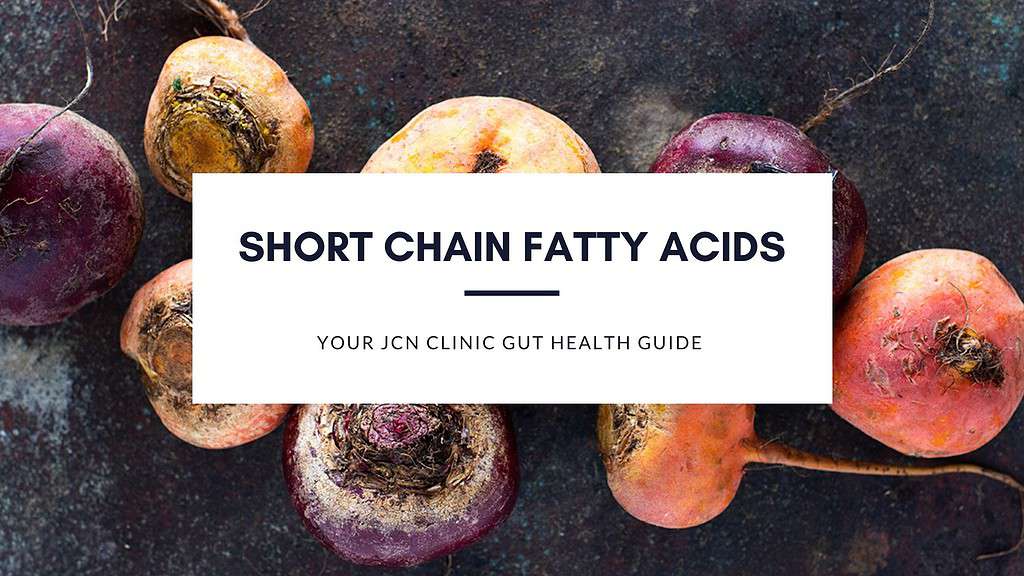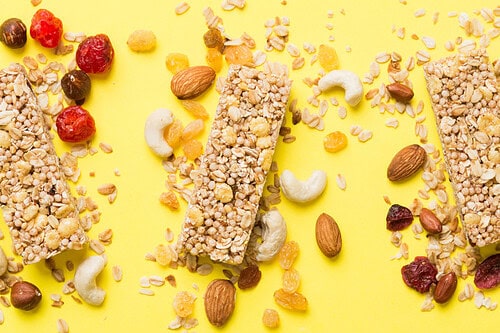
In todays gut health focused climate, there is a lot of talk and attention around the microbiome and associated gut health products like collagen, probiotics and more recently, prebiotics. A lot of you probably have heard that prebiotics are good for you, but you may be a little unsure as to why. Likewise, with a lot of talk and attention on the bacteria that reside within our gastrointestinal tract, there is now a hum around short chain fatty acids (SCFA). However, I know that in clinic when I ask my clients about their understanding of SCFA (especially when discussing comprehensive stool test results) there is a lack of understanding to what SCFA actually are. So, what are SCFA? – and are low Short Chain Fatty Acids causing your gut issues?
what are short chain fatty acids (SCFA)?
SCFA are organic acids produced by bacteria within your gut. They are a by-product of fermentation of the food we eat on a daily basis, in particular undigested carbohydrates and resistant starch, with also some minimal fermentation contribution through protein. We produce three different types of SCFA and they are:
- Buytrate
- Propionate
- Acetate
Each of these SCFA has a variety of functions that are unique to them, whilst also exhibiting collective functions as a group. Research has shown a multitude of benefits, with a major highlight on Butyrate in particular.
Once produced, SCFA are transported into systemic circulation and have the ability to effect our metabolic processes by binding to protein receptors (called G-protein coupled receptors). These receptors are found in a multitude of metabolically active tissue within our body and play an integral role in the regulation of many daily processes. (1)
what is the function of butyrate?
Butyrate is produced by bacteria (largely by the the ‘phylum’ (family) Firmicutes through the fermentation of non-digestible polysaccharides in the lower intestinal tract. Once produced, butyrate is easily absorbed into circulation through the gut to the liver. Butyrate exhibits the following functions, locally within the gut and systemically:
- Butyrate provides a major energy fuel for the cells within the colon called ‘colonocytes’ (2)
- Butyrate contributes to overall cellular energy within the body (3)
- Butyrate has potent anti-inflammatory effects that support gut barrier function and mucosal immunity. (This is through its ability to inhibit histone deacetylases, which in turn helps regulate genes, modulate the immune system and reduce oxidative stress) (4) Additionally, butyrate has been show in studies to be low in people suffering from Ulcerative Colitis.(5)
- Butyrate helps modulate intestinal motility encouraging regular bowel movements (6)
- Butyrate slows growth and activating programmed cell death (apoptosis) in colon cancer cells (7)
- Butyrate regulates sleep and circadian rhythm due to a suspected sensory mechanism within the liver or the liver portal wall (the major vascular ‘highway’ from the gut to the liver). (8)
- Butyrate increases lipid (fat) oxidation and thermogenesis (9)
what is the function of acetate?
Acetate is the most abundantly produced SCFA. Some acetate is converted to butyrate by bacteria within the local area of the gut, though the majority of acetate largely travels systemically to exert its effects such as:
- Acetate reduces appetite by effecting regulatory neuropeptides in the brain, consequently effecting hormones in the gut that regulate our appetite. (10)
- Acetate is used by peripheral tissues for lipogenesis (regulation, production and storage of fat) or as fuel for muscle cells. (11)
- Acetate controls & regulates pH within the gut helping inhibit adverse microbial growth (12)
what is the function of propionate?
Propionate is gaining more attention for its ability to regulate and therefore control metabolic health, hence providing exciting research in the field of obesity and diabetes. Propionate most note worthy effects are noted to as:
- The major role of propionate (along with butyrate) is to switch on intestinal gluconeogenesis (production of glucose from non carbohydrate forms), which provides metabolic benefits such as regulation of body weight and control of glucose levels.
- Propionate induces the production of gut hormones that have the ability to regulate food intake through levels of satiety. (13)
- Propionate control and regulation of intestinal inflammation (14)
- Propionate lowering of cholesterol levels (15)
Need personalised nutrition advice catered to your needs?
If you are after personalised nutrition advice and dietary planning individualised to your health and dietary needs then contact us at The JCN Clinic with your enquiry. We are always happy to answer any questions you have!
how to increase short chain fatty acid production
With all of these exciting benefits, how can we go about ensuring we are maintaining robust levels of SCFA’s for our gut health? I’m glad you asked! We can increase short chain fatty acid production by ensuring we eat a broad wholefood diet, rich in a variety of fibres. In the majority, the production of short chain fatty acids is created through the fermentation of undigestible carbohydrates, which highlights the importance of carbohydrates within the diet. Some of the key players for increasing SCFA output are:
- resistant starch foods – just ripe banana, cooked and cooled potatoes, cooked and cooled sweet potatoes, cooked and cooled rice, banana flour
- fos/inulin rich foods – artichokes, asparagus, onion, garlic, leek, chicory root, banana
- gos (galactooligosaccharides) rich foods – legumes, fennel, butternut pumpkin, cashews, pistachios, soy beans
- Xylooligosaccharides – honey, bamboo shoots
Some of these prebiotics can also be taken as supplements, although it is always best to work with a clinical nutritionist to ensuring you are taking the most appropriate type and dosages for your gut health issues.
On reflection of the above, I am hoping you can see the importance in asking are low Short Chain Fatty Acids causing your gut issues? Realistically, if you struggle with gut issues, or have even had past stool testing completed that has shown low SCFA output, then supporting your production of these organic acids produced by the bacteria in your microbiome is integral. If you need support or guidance with how to do this, especially if you have chronic gut issues please reach out to us at The JCN Clinic as we would love to help!
The JCN Clinic is offering 15% OFF INITIAL CONSULTATIONS FOR ALL OF JULY WITH ALEXA TRAN! To take advantage of this offer, just email or call us at The JCN Clinic, OR book online here with Alexa.
Jessica Cox is a qualified practicing Nutritionist with a Bachelor Health Science (Nutrition) and over 15 years of clinical experience. She is the founder and director JCN Clinic, published author and established recipe developer. Jessica is well respected within health and wellness space for her no fad approach and use of evidence-based nutrition.





